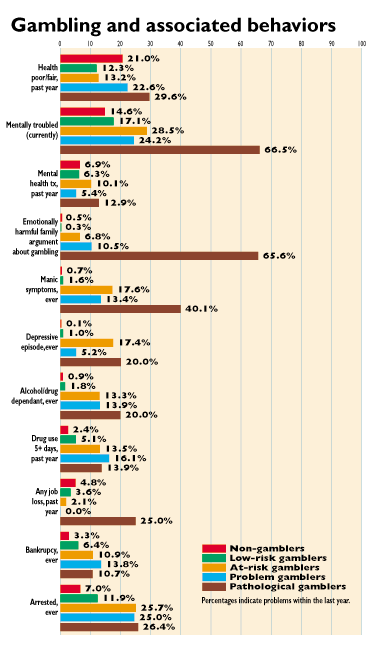
National Collegiate Athletic Association |
The NCAA News DigestJuly 19, 1999
Gambling and associated behaviorsA study that appeared in the report of the National Gambling Impact Study Commission shows the correlation between the degree to which an individual is involved in gambling and various health, mental health, substance abuse and other personal problems. The study, the Gambling Impact and Behavior Study done by the National Opinion Research Center at the University of Chicago, Gemini Research and The Lewin Group, shows that pathological gamblers -- those with the greatest difficulty in controlling their impulses to gamble -- have greater health problems and more emotional difficulties than the general population. Further, they also are more likely to experience substance-abuse problems, job loss and encounter problems with the law than other population subsets.
NATIONAL OFFICETelephone, computer service to be affected by move Although the down time during the national office relocation to Indianapolis will be kept to a minimum, telephone and online services will be affected from 5 p.m. July 21 through 8 a.m. July 27. Although staff availability will be affected during the July 21-27 period as the first wave of employees relocates from Overland Park, Kansas, to Indianapolis, a telephone switchboard will be maintained in Kansas City to assist the membership. Beginning July 27, calls to the Overland Park number either will be forwarded to Indianapolis or callers will be given a recorded message advising them of the new number (317/917-6222). When full telephone service begins at the Indianapolis facility July 27, the membership may experience delays or occasional misrouting of calls because the switchboard staff will be new. Also, the extension and direct-dial numbers for all staff members will be new, which will present another complication. NCAA Online, the Association's site on the World Wide Web, also will be down from 5 p.m. July 21 to 8 a.m. July 27. Among the services that will be interrupted as a result are the legislative services database and NCAA News online classified advertising.
GOVERNANCESummer meetings approaching for Divisions I, II and III groups The Divisions I, II and III Management Councils will meet July 26-27 in Hilton Head, South Carolina. The Division I Board of Directors and the Divisions II and III Presidents Councils will meet a week later, gathering August 5 in Indianapolis. The summer meeting of the NCAA Executive Committee will occur August 6 in Indianapolis.
Staff contacts: S. David Berst (Division I), Mike L. Racy (Division II) and Daniel T. Dutcher (Division III).
BASKETBALLAutomatic qualification sought for two conferences The Division I Men's Basketball Committee has recommended to the Management Council that the Western Athletic and Mountain West Conferences receive automatic bids to the championship beginning with the 2001 tournament. The committee also gave its support to the intent of a Management Council subcommittee appointed to evaluate automatic-qualification issues, particularly as they apply to the migration of non-Division I teams into Division I and the continuous reorganization of Division I conferences. In other action, the committee responded to the President's Advisory Team's recommendation that sports committees review instances where the names of championships include "men's" or "women's." The committee noted the equity that has been built over many years with the "Final Four" term and the term's value to the organization, and suggested that both the men's and women's Final Four be permitted to use that mark. Staff contact: William R. Hancock.
SPORTS SCIENCESCommittee stresses education on dietary supplements The NCAA Committee on Competitive Safeguards and Medical Aspects of Sports during its recent meeting emphasized the importance of education concerning the use of supplements in collegiate athletics. Frank D. Uryasz, NCAA director of sports sciences, said that educating student-athletes about supplements is important to prevent the use of products that are harmful or may cause a positive drug test. Staff contact: Randall W. Dick.
|
